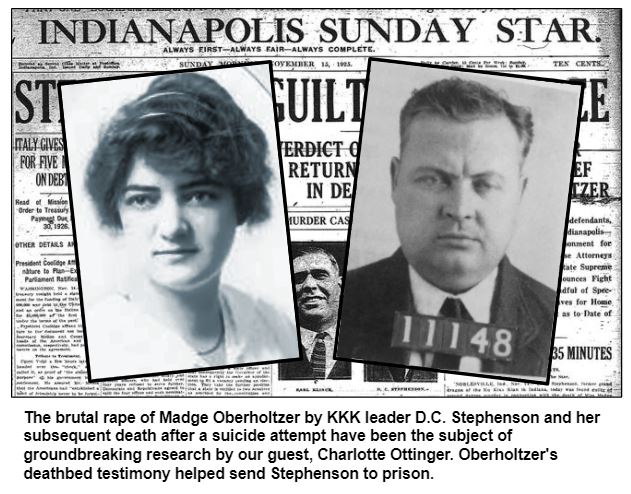Hoosier History Live is an independently produced new media project about Indiana history, integrating podcasts, website www.HoosierHistoryLive.org, weekly enewsletter, and social media. Its original content comes initially from a live with call in weekly talk radio show hosted by author and historian Nelson Price. You can hear the show live Saturdays from noon to 1 pm ET at WICR 88.7 fm or stream the show live at the WICR HD1 app on your phone, or at our website.
June 22, 2024
Busting myths about historic houses

Maybe you have heard some of these comments about houses built in the 1800s and early 1900s:
"They never had closets." "Anything that sticks out of the house – like a wing -- was a subsequent addition." "Their only light was from candles or kerosene lamps."
 These are widespread misconceptions that our distinguished guest, Indianapolis-based architectural historian Benjamin L. Ross of RATIO Architects, plans to dispel when he joins Nelson in-studio. For more than 15 years, Ben Ross has been involved in analyzing, interpreting and planning for the future of historic sites in Indiana and across the country, including well-known historic houses.
These are widespread misconceptions that our distinguished guest, Indianapolis-based architectural historian Benjamin L. Ross of RATIO Architects, plans to dispel when he joins Nelson in-studio. For more than 15 years, Ben Ross has been involved in analyzing, interpreting and planning for the future of historic sites in Indiana and across the country, including well-known historic houses.
Some myths about historic houses are so pervasive that they even are repeated to visitors by well-intentioned docents at the sites, Ben says. They include: "The back part of the house is shorter and simpler, so it must be older." "Almost everyone was a homeowner." "Many people lived in one place their entire lives." In some cases, Ben says, the myths distort social history and the way people lived in the 1800s and early 1900s.
A historic preservation specialist as well as an architectural historian, Ben Ross has been involved in projects at the historic Shrewsbury-Windle House, which was built in Madison, Ind., during the 1840s; the Lincoln Home National Historic Site in Springfield, Ill.; and the Benjamin Harrison Presidential Site in Indianapolis. His other projects have been at the President Warren G. Harding House, which was built in Marion, Ohio, during the early 1890s, the historic Mount Pleasant Beech Church in Rush County, Ind., and the King Family Home at the Martin Luther King Jr. National Historic Site in Atlanta.
For a flavor of the misconceptions that Ben Ross will tackle during our show, here is a sampling, along with some of his insights about historic houses:
-
 "They never had closets". According to Ben, "Many historic houses had closets. These were sometimes called 'presses' or 'cupboards'. Closets often filled unusual space next to a projecting chimney." At the Shrewsbury-Windle House, closets were built during the home's construction in the 1840s. Ben also notes that, in the 19th century, people stored clothing differently than today. Clothes often were folded and placed in drawers or in a wardrobe. Some clothes were hung on pegs or hooks on a wall.
"They never had closets". According to Ben, "Many historic houses had closets. These were sometimes called 'presses' or 'cupboards'. Closets often filled unusual space next to a projecting chimney." At the Shrewsbury-Windle House, closets were built during the home's construction in the 1840s. Ben also notes that, in the 19th century, people stored clothing differently than today. Clothes often were folded and placed in drawers or in a wardrobe. Some clothes were hung on pegs or hooks on a wall. -
"Any portion of the house that sticks out was a subsequent addition". The references to an "addition" are overstated. Regarding two-story houses with a one-story kitchen that "sticks out", Ben says: "Kitchens and other service spaces often projected from the main building. If you think about the experience of cooking in our climate prior to air conditioning, you want to separate the kitchen from the living spaces as much as possible, and to provide it with good ventilation."
-
"Many people lived in one place their entire lives". Ben's take: "This is a persistent myth about the past. Many people will tell you that everyone today is mobile and unconnected to the past. We actually move less today than Americans did 50 years ago. When you go back to the 19th century, you find that people were incredibly mobile. High percentages of Hoosiers in the 19th century had been born in Eastern states or in other countries."
Latest Podcast Available!
Latest Podcast Available!

For a complete list of show podcasts and show enewsletters, please go to ARCHIVES on our website.
Your contributions help keep Hoosier History Live on the air, on the web, in your inbox, and in our ARCHIVES!
To receive our weekly Hoosier History Live newsletter, sign up here.




